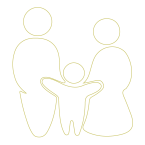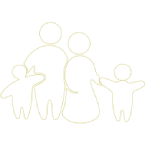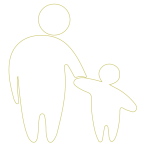Domestic Violence Awareness Month: Domestic Violence Affects Every Member of the Family
Domestic Violence Awareness Month: Domestic Violence Affects Every Member of the Family
Each October, we observe Domestic Violence Awareness Month to recognize and bring attention to the widespread impacts and occurrences of domestic violence. As defined by NJDCF, “Domestic violence occurs when an individual commits acts intended to harm or instill fear in another when a special relationship is present.” The type of harm inflicted in a domestic violence situation is not limited to physical abuse, but also includes verbal abuse, sexual assaults, threats of violence, financial control, and social isolation. Domestic violence has long-lasting consequences for survivors, both physical, mental, and social.
Domestic violence affects every member of the household.
In circumstances where children are present, domestic violence highly correlates with the presence of child abuse and vice versa. With children present, cycles of violence and trauma affect them and manifest in varied ways throughout their lives.
Behavioral changes are a strong indicator of how deeply affected children are by domestic violence in the long term. These behavioral changes stem from a place of fear and anxiety. Many children encounter challenges in school resulting from these changes, such as increased conflict, detention, and suspension. Children who witness violence between parents may also be at greater risk of being violent in their future relationships. For young children in a home where domestic violence is present, they often revert to behaviors from when they were infants or toddlers, such as bed-wetting, thumb-sucking, and increased crying and whining. While younger children are seen externalizing behavioral changes, middle-aged children are more cognizant of the presence of domestic violence and often internalize guilt and blame. This affects their self-esteem, school participation, and social life. Teenagers affected by witnessing abuse are seen to present negative behaviors such as engaging in conflict with family, neglecting school, substance use, and risky sexual behavior.
While these changes signal trauma that deeply affects children, healing is possible. Early intervention is the best way to help a child process the effects of domestic violence in the home and child abuse. At Center For Family Services, counseling and therapeutic services are offered by Peaceful Tomorrows to children and families who have been victims of domestic, familial, or dating abuse. A secure setting is offered by Peaceful Tomorrows to help children, and their non-offending parents recover from the trauma they have experienced. The goal of services is to unite families and create networks of support.
If you or a loved one are a parent who is experiencing abuse, it can be difficult to know how to protect the child involved.
Family separation is a leading anxiety for victims of domestic abuse in their search for help. For authorities, the co-occurrence of domestic abuse and the presence of children is a tricky issue. The non-offending parent is often held accountable for a partner's violence. Everyone suffers when kids are taken from the house. According to research, children are best served when they can stay with their parents and when the system works to ensure their safety. With the awareness that domestic violence and child abuse are correlated acts of violence, it is important for experts and service providers for domestic violence and child services work together to provide the best and safest outcome for children and survivors of abuse. This partnership has placed a SERV Domestic Violence Liaison on-site at Cumberland and Gloucester Counties CP&P offices to work on cases involving domestic violence and child abuse.
To learn more about Services Empowering Rights of Victims (SERV) and in New Jersey's Camden, Gloucester, and Cumberland Counties, visit: https://www.centerffs.org/serv.
Sources:
Effects of domestic violence of children: https://womenshealth.gov/relationships-and-safety/domestic-violence/effects-domestic-violence-children
Child Abuse and Domestic Violence: Connections and Common Factors: https://preventchildabuse.org/latest-activity/child-abuse-and-domestic-violence-connections-and-common-factors/



